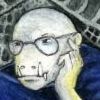
Bernd Heinrich - Winter World
(This is repost from LJ. This was the first BookCrossing book I received, from the NYC. Reading it in the middle of the local heat wave felt somewhat paradoxical…)
Bernd Heinrich is an US biologist I had only heard about before I received this book. In this particular book he writes about various wintering habits of various animals, partially based of his own experiences in New England and Vermont. Heinrich uses mostly the metric system but does present a conversion table. He has illustrated the book himself.
It may sound Heinrich is somewhat callous when he honestly tells about some of the research methods (in addition to saying that the sample birds were "collected" he also states that they were in fact shot.) However, personally I might have picked the injured turtle down, not driven over it and decapitated it…
Some animals resist freezing when others promote it, both in order to stay alive over winter. Some of these include changes in the animal metabolism like squirrels having supercooled blood and still preventing brain death; turtles buffering their blood with potassium and calcium ions to reduce the lactic acid; muskrats carrying more oxygen in their blood; frogs have glucose that restrict ice-crystal formation outside the membrane cells; and so on.
Clinical interest may outweigh intellectual curiosity if some people effectively want to turn into bears to maintain their muscle tone in passivity, like the bears do during their hibernation (effectively recycling waste products to keep their muscles healthy.) I bet pro-cryogenic transhumanists would read that with glee.
Book is also full other details of animal life, including kinglets who incubate their eggs by warming their feet, squirrels reusing bird nests, packs of hibernating turtles under the ice and multispecies bird flocks.
In addition to quoting others in his field, Heinrich also has his own theories, including speculation that that feather's originate as insulation against cold and wetting before becoming flying aids. However, I disagree with Heinrich's assertion that there are no theistic entomologists.
